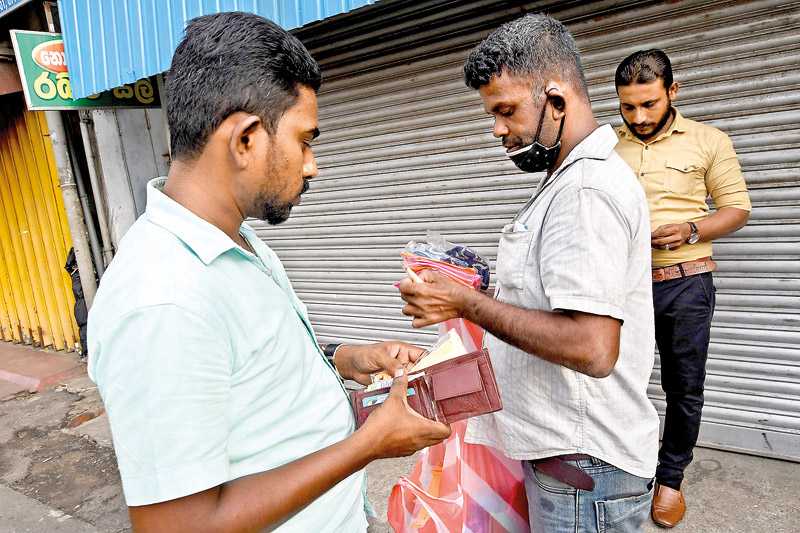Wednesday Feb 18, 2026
Wednesday Feb 18, 2026
Wednesday, 5 May 2021 00:00 - - {{hitsCtrl.values.hits}}

People can be seen traveling here and there without face masks and organising events and parties amidst this situation. There is a problem with discipline – Pic by Shehan Gunasekara
 Now, as a nation, we have reached a really critical stage with the corona pandemic. This is what Hindustan Times reports on 2 May: “Sri Lanka’s health authorities have issued new tough guidelines, including banning wedding receptions and gatherings at religious sites, to prevent the spread of the coronavirus as the island nation continued to record a spike in daily infections”.
Now, as a nation, we have reached a really critical stage with the corona pandemic. This is what Hindustan Times reports on 2 May: “Sri Lanka’s health authorities have issued new tough guidelines, including banning wedding receptions and gatherings at religious sites, to prevent the spread of the coronavirus as the island nation continued to record a spike in daily infections”.
The time has come for all citizens of the country to understand the gravity of the disaster. Anyway, we have witnessed a section of Sri Lankans enjoying despite many restrictions. People can be seen traveling here and there without face masks and organising events and parties amidst this situation. There is a problem with discipline. And also, I have observed that there is a segment of people who violate health guidelines and the same segment posting messages on social media, criticising authorities. This ‘duplicity’ must be interesting social research for investigators to read people in a different microscope.
Ownership and empowerment
At the moment we could not see any ‘ownership’ of this disaster among Sri Lankans. I believe still we can see only ‘health education’ in the country and we need to change this to ‘health promotion’. The country needs to consider this as top urgent under these circumstances. The Government should carefully use some stakeholders in this mission of ‘Health Promotion’. Refer to the given diagram for some selected sectors to take initiative.
The role of the Health Promotion Bureau should be redefined. And the role of the Ministry of Education should not be underestimated in this context to communicate messages to relevant parties including schoolchildren and parents. In this task force, there can be community leaders, experts in the industry, representatives of media and some researchers as well. All members should have a clear plan (short-term strategy and long-term objectives) to address this pandemic situation.
We have seen many times the media reporting about people who violate health guidelines. But rather than concentrating on the ‘negative’ side, there can be ‘positive’ reporting as well (as an example a worker in Colombo Municipal Council adhering to all guidelines by showcasing an example for the community). This is the time we need to have positive news (http://www.ft.lk/columns/Negative-and-positive-news-Rare-corpse-flower-set-to-bloom-at-Royal-Botanical-Gardens-Peradeniya/4-658936) for better immunity of people!
And also, there are many success stories that need to be followed by a taskforce of ‘health promotion’. In this context, we can discuss the success story of Vietnam. As International Monetary Fund (IMF) reports in 10 March, “Swift introduction of containment measures, combined with aggressive contact tracing, targeted testing, and isolation of suspected COVID-19 cases helped keep recorded infections and death rates notably low on a per capita basis (IMF,2021)”. And also, as per fitchratings.com, “Vietnam’s economy has been more resilient than most other markets in the Asia-Pacific as the local authorities have had greater success in containing COVID-19. It was one of the few economies in the region to report GDP growth in 2020 (fitchratings.com, Thu 22 Apr, 2021). More importantly like in Vietnam we also should have a successful communication strategy. Refer below:
“Vietnam’s successful communication strategy catalyses the active participation of both governmental and private sectors as well as communities. The government centers its people in an active role with the slogan translated as ‘every citizen is a soldier’. In addition, nongovernment-led initiatives including the donation of funds and personal protection equipment by entrepreneurs and individuals have contributed positively to social stability. For example, ‘the rice ATM’ – a free rice dispenser reserved for the most vulnerable people, including those who lost income due to the pandemic, the elderly, students and disabled people.
“Students have been mobilised to assist in epidemic control by engaging them in various roles such as data entry, sample collection or provision of phone counseling for COVID-19 suspected people. However, the number of students who joined the COVID-19 taskforce was very small (124 volunteer medical students) compared to its capacity. At the central level, a relief bill of approximately 80,600 VND billion was signed by the government to address the financial burden resulting from the COVID-19 pandemic. Nearly 62,000 VND billion of these funds were allocated to individuals who were poor, near poor, with meritorious services or under social protection schemes. The remaining funds were allocated to support small to medium production and business establishments.” (The COVID-19 global pandemic: a review of the Vietnamese Government response – https://www.joghr.org/article/21951-the-covid-19-global-pandemic-a-review-of-the-vietnamese-government-response)
Conclusion
The time has come for Sri Lanka to think differently, learn, and work with responsibility. This is a disaster in which we need to stop the ‘blame game’ and to understand the situation with more responsibility. If we can use ‘health promotion’ in an effective way it would be one of the success stories for the world and always helping for long-term sustainable development of the nation.

(The writer is a Professor in Management Studies, Faculty of Management, Management Studies, The Open University of Sri Lanka. You can reach Professor Abeysekera on [email protected].)